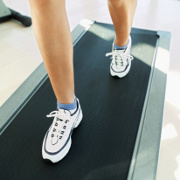According to the latest research, women who count more years between their first period and menopause actually have a lower risk of developing Parkinson's disease. These findings which appeared in a USA Today article by Mary Brophy Marcus, will be presented at the American Academy of Neurology's 61st annual meeting in Seattle in April.
This research indicates that longer exposure to the body's own hormones may indeed help protect the brain cells which are affected by Parkinson's disease. The author of the study is Rachel Saunders-Pullman of Albert Einstein College of Medicine and Beth Israel Medical Center in New York.
The article says, "Parkinson's is a nervous system disorder that occurs when special brain cells that make dopamine, a chemical messenger in the brain, die or become impaired. It leads to trembling and movement problems."
In the study the records of 74,000 women who had natural menopause were examined, and those of 7,800 women who had surgical menopause were also examined. In the natural menopause group, those who had a fertile lifespan of more than 39 years had about a 25 percent lower risk of getting Parkinson's than those with a fertile lifespan of less than 33 years.
Women who had menopause from surgery had almost twice the risk of developing Parkinson's if they had taken hormone therapy in the past and stopped, than if they had never taken hormone therapy. The taking of hormones had no effect on natural menopause women.
Author Saunders-Pullman says, "This study does not support a role for treatment with hormone therapy in preventing Parkinson's, but there are still many unanswered questions."






Add a CommentComments
There are no comments yet. Be the first one and get the conversation started!